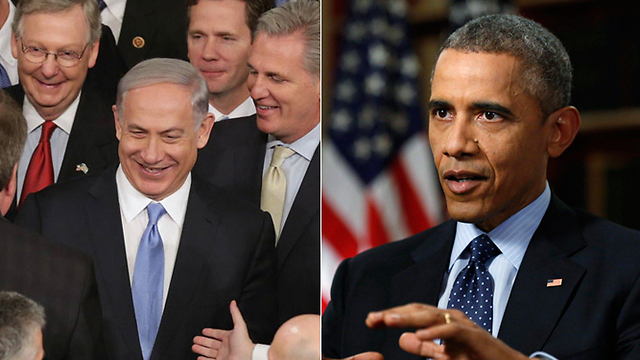
If Israel receives aid from Congress without asking for it, it must return it to the administration
צילום:רויטרס
Netanyahu's secret commitment to Obama
Analysis: Following Sen. Lindsey Graham's objection to the MOU signed between US and Israel, the prime minister was forced to write a letter in which Israel pledges not to request any additional aid from the two Houses of Congress.
The memorandum of understanding on a military aid package, which was signed in Washington on Wednesday between the American administration and Israel, is a generous move, which points to the Obama administration's dedication to Israel's security and to its devotion to the commitments he gave Democratic senators during the battle over the nuclear agreement with Iran.

Thirty-eight billion dollars is a huge sum, which no other country has received, regardless of how good its relationship with the United States is. This was done by President Barack Obama, no one else. He deserves gratitude.

In the agreement, Obama managed to put an end, once and for all, to Congress' involvement in the administration's relations with Israel (Photos: AFP, Reuters) (צילום: רויטרס, AFP)
Nonetheless, the tensions between Jerusalem, the Republican Congress and the White House left their mark on the agreement. Obama sought to put an end, once and for all, to Congress' involvement in the administration's relations with Israel. He achieved it in the current agreement. Israel will allegedly not be able to play with the different authorities in Washington, receive something at the White House and then send the Jewish lobby to the senators in an effort to receive more.
After Republican Senator Lindsey Graham, chairman of the Appropriations Committee, announced that he was not bound by the MOU, and that he would provide Israel with aid in addition to what it receives in the agreement, the White House threatened to cancel the agreement. Prime Minister Benjamin Netanyahu was forced to write a letter which has yet to be published. In this letter, Israel pledges not to request any additional aid from the two Houses of Congress. It provides another commitment: If it receives any aid from Congress without asking for it, it will return the money to the administration.
This is an unusual commitment. On the positive side, it indicates that the two most important political institutions in the world are competing against each other over who will give Israel more; on the negative side, it points to the administration's suspiciousness towards the Israeli government and Israel's friends in Congress.
The agreement also determines that two bonuses that were given to Israel in the previous MOU will be canceled: The allotment of $400 million a year for fuel purchases will be canceled as soon as the agreement takes effect, on October 1, 2018. The allotment of $850 million a year for the IDF's purchases from Israel's defense industries will be canceled gradually. The fuel budget was a nice gift at the time, but is unnecessary now that Israel has become a gas power. The budget for purchases in Israel harmed the American defense industries, so its cancellation is justified.
The Americans should be given credit for not cutting those sums from the total military aid. That means, on a practical level, that Israel will be able to purchase another group of F-35 stealth fighter jets as part of the aid. The aid packages secures Israel's qualitative advantage in the purchase area in the next 12 years. That also applies to the anti-missile defense systems: The agreement puts Congress's allotments for the development of missile plans at the basis of the budget. The sum is identical.
In total, the aid will grow by $200-300 million a year, which is a nice sum but much lower than the sum discussed before Netanyahu's Congress speech. When inflation is taken into account, the sum gets close to the reality today.
In a conversation I had with White House officials Wednesday evening, they stressed that the agreement was flexible. If Israel faces a state of emergency, a war or a serious intifada, discussing an increase in the aid will be possible. The following sentence is my interpretation: All options are on the table, apart from a game between the White House and Congress.











